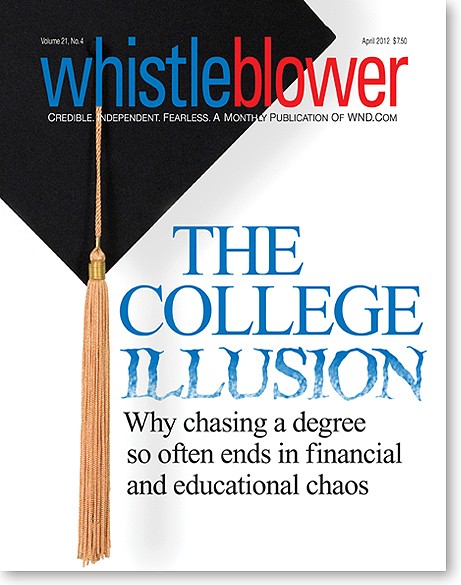
High-Schoolers Earn More Than College Grads
WND
New study shows students wasting money at these institutions
The costs of college are skyrocketing and the economy under Barack Obama has been uncertain, so how is a student supposed to know what to do?
The Payscale.com website has posted a study that compares hundreds of colleges across the nation, and their “return on investment.”
That would be, in general terms, what a person makes over a lifetime based on a degree from that school, minus the costs.
The report, for example, cites the top private university as being California Institute of Technology, and explains that school’s “return on investment” over the course of a lifetime is $1.7 million.
The top engineering institute was listed as Harvey Mudd College, with a ROI of $1.6 million. For business schools, tops was Babson College, with an ROI of $1.2 million, and the top public university was Cal-Berkeley, with an ROI of more than $1.1 million.
Amherst was listed as the top liberal arts university, at $1.1 million plus and the top arts, music and design college was Rhode Island School of Design, at $618,000.
A report at Jobs.AOL.com explained, “The calculations are based on the average amount that alumni of their respective colleges earned working – minus the total cost of college – and the amount that would have earned as a high school graduate.”
The report noted that Savannah College of Art and Design was “dead last” in the rankings, with an ROI of minus $189,000. That means theoretically, a person would have earned $189,000 more over a lifetime as a high school graduate rather than attending the school.
But AOL reported even the lower-ranked schools had their defenders.
“The skills that I learned through my degree program are incredibly valuable,” a Savannah student who identified himself as Chris Brinlee Jr. said.
Others at the bottom end of the assessment included Lewis & Clark College, University of North Carolina at Asheville, Flagler College, Concord University, Cedarville University, Columbus College of Art and Design, University of Illinois-Springfield, Anderson University, Jackson State, University of Montevallo, Marywood University, College of the Ozarks, Meredith College, Medialle College, Judson University and Seton Hill University.
Payscalle reported, “In calculating the return on investment, we must first determine the investment in college and the return from attending college. The investment is the cost of college as determined by the actual cost of attending college. The return (gain) is the additional expected future income stream received for being a college graduate.”
The report was referenced by the SunSentinel website, which said Flagler was the only Florida institution on the bottom 20 list.
Another extensive report recently took the question one step further.
April’s Whistleblower magazine, “THE COLLEGE ILLUSION,” reports how the “almost sacrosanct belief in college” suddenly is changing.

The report documents the university experience has now racked up so many negatives – while increasingly failing to deliver on the vaunted promise of career and financial security – that young people in the age of the Internet and gee-whiz communications are exploring other ways to obtain the “higher education” they desire.
Highlights of “THE COLLEGE ILLUSION” include:
- “The very high cost of college” by Joseph Farah
- “The college illusion” by David Kupelian
- “The college scam” by John Stossel, urging readers to rethink the notion that an expensive degree is necessary for success
- “College students given $100,000 to drop out!” by Art Moore, on why a top tech entrepreneur is paying youngsters to try an alternate route to success
- “Higher education the next bubble to burst?,” on what’s likely to happen to the astronomical cost of college
- “The dangers of ‘higher education’” by Thomas Sowell, on the negative and surprising consequences of the growth of “soft” curricula
- “What you’re paying for your child to learn at college” by Dennis Prager, who quotes college presidents admitting the true purpose of higher education: “to undermine your dad’s values”
- “Colleges as ‘boot camps’ for gay activists” by Bob Unruh, showing how “Queer Studies” amounts to a full-fledged LGBT indoctrination program
- “Major study proves the left owns America’s colleges” by David Horowitz and Eli Lehrer, demonstrating why “Most students graduate without ever taking a class taught by a professor with a conservative viewpoint”
- “Sex in the classroom” by Ben Shapiro, a shocking, eye-opening first-hand account of wanton sexual anarchy on the modern college campus, where the prevailing attitude is: “Homosexuality is perfectly normal. Pedophilia is acceptable. Bestiality is fine.”
- “Women prostituting themselves to pay for school” – although they prefer to call it “seeking an arrangement” between “sugar babies” (students in need of financial support) and “sugar daddies” (older men who provide financial support in exchange for companionship and sex).
- “Student loans now surpass credit card debt” – incredible, but true
- “College freshmen undergo Maoist brainwashing” by David Kupelian, on new students being compelled to endure mandatory “diversity seminars” strikingly similar to personality modification techniques perfected by Chairman Mao Zedong in communist China
- “Is college really worth it?” by Phyllis Schlafly, on why government should get out of higher education to bring down costs
- “Surprise! Psychologist exposes bias in the academy” by Art Moore, on the “statistically impossible” lack of true diversity in America’s universities
- “College: A dangerous place for men” by Phyllis Schlafly, exposing an Obama policy on sex accusations that deems males guilty until proven innocent
- “Far too many people are going to college” by Walter Williams, on how “higher ed” has been dumbed down to keep students coming and the money flowing
- “God’s new Harvard” by Alyssa Farah, on Patrick Henry College, a school America’s founders would have been proud of
- “How Hillsdale thrives with no government aid”
- “A college degree? Not for my kid” by Patrice Lewis, on why, for many, “higher education” no longer has the value it once did
